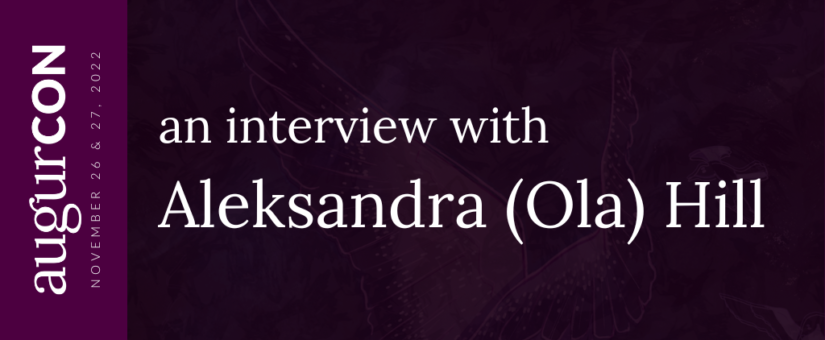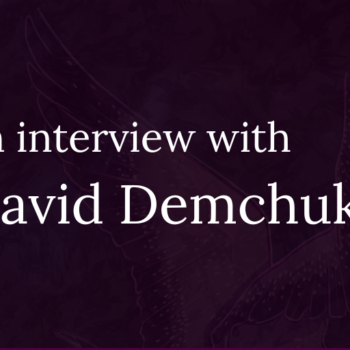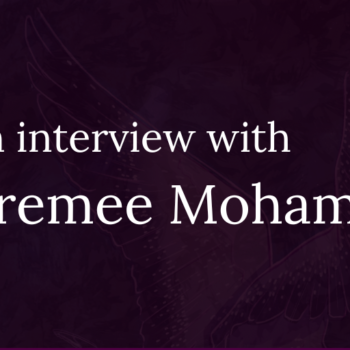
An interview with Aleksandra (Ola) Hill #AugurCon2022
- Posted by Augur Blog
- On November 17, 2022
- 0 Comments
- author interview
On November 26 & 27 we’re hosting our second-ever AugurCon, our virtual celebration of speculative literatures! We’re joined by over 45 amazing guests, including authors, poets, editors, and publishing professionals, to explore the intersections of the world we know—and the ones we dare to imagine.
We connected with Aleksandra (Ola) Hill, founder & EIC of khōréō, who is a panelist at this year’s AugurCon.
Get your ticket to attend her panel:
Cultivating an Empathetic Author-Editor Relationship
Saturday, November 26 at 5–6:00 PM EST / 2–3:00 PM PST
To see the full weekend program schedule, visit our website.
Tell us about your writing process! How did you get started writing? Do you have any favourite writing haunts (i.e. places) or rituals?
I wrote a little as a kid, but I was always told the stuff that I loved most—speculative fiction—wasn’t “worth” writing; same with fan fiction. I had no idea how to write literary fiction, though, so I just… stopped. It wasn’t until I was close to the end of my PhD, around 2016, that I picked it back up and ran with it. Turns out that getting your research torn apart again and again really gives you perspective on how many people are out there giving good feedback—and also how many have no idea what they’re talking about. It really gave me the confidence to say, screw it, I’m going to write what I want.
Before the pandemic, I’d love heading to a local bar and having a couple of drinks while writing, but now my process is all over the place (though I do try to head to a local Italian place with my computer for a negroni on Friday afternoons!). The one thing that’s been consistent is my use of 4thewords, which is basically Pokémon but for writing. Putting the little “write for 5 minutes continuously” monster battles up really lets me dive into writing and get words on the page!
From your bio, it looks like you have your finger in a lot of different pies. Does your background in computational biology factor into how you approach your creative writing, or are they totally separate beasts? If they inform each other, how?
Oh, that’s an interesting question! I talked a little above about how the feedback you get in research helped give me the confidence to write; it also helped prepare me for the workshop experience, which has been helpful. I also feel like designing experiments and research projects has helped me put together stories better because it’s taught me to think about how small steps can build up to a whole discovery.
But! I’ve also found it can be really unhelpful at times, because I find myself trying to explain/find the rationale for every small thing in a story, like how a magic system works or the rules of the world. Sure, you need some of that, but sometimes magic can just be magical. I’ve been working on giving myself permission to just wave a hand and say, “I’m doing it this way because I want to and it’s cool” and not killing the joy of the piece for myself.
At Augur, we think a lot about “stories for the future we need.” khōréō was launched with the aim of bringing more diasporic and inter-cultural stories into the spec fic landscape. How has the industry changed since khōréō‘s launch? How has your perspective on doing this hopeful work changed? What are you most proud of?
I don’t think that our launch has spurred a specific change in the industry, so much as that khōréō’s been a part of the change, if that makes sense. Publications like Augur, FIYAH, and Strange Horizons have been out here doing the work for years, and they were such strong inspirations for this little magazine!
We’re trying to be a part of that change by really pushing ourselves to think broadly about stories and publish ones that are different, that question and break the boundaries that “typical” speculative stories have taken as gospel, like three-act structures, “active” protagonists, etc. And, most of all, we want to bring more kindness to the industry, from how our first readers approach submitted stories all the way through publication. We keep the authors in the loop every step of the way, including voice actor casting and spot art; our editorial approach is focused on realizing the author’s vision in the best way possible.
And, because of that, I think the thing I’m proudest of is how many times we’ve heard from authors that khōréō was their best editing experience—and sometimes even their best rejection, because they saw that whoever read it really understood what they were going for, even if it didn’t work out. I’m so deeply proud of this team, of everyone who has given their time to us, and feel so incredibly fortunate that the internet brought us together.
You’re on our panel talking about author–editor relationships—something you have plenty of experience with on both sides of the table! If you’re talking to a writer who’s just starting out, what is the number one thing you would tell them that you wish someone had told you: the good, the ugly, the hopeful?
Okay, so, I’m going to pretend I didn’t see you ask for just one thing and say three. Sorry!
First: A rejection doesn’t mean that your story isn’t good. We get so many stories that come through our queue that we loved but we just can’t take. There are stories that we rejected during our first submission period—October 2020—that I still think about, that I cheered for when I saw they found a home. There are authors whom we’ve gotten stories from every period, and whom we’ve rejected every period, but whom I am SO thrilled to see in the queue again because I KNOW one day we’ll get a perfect fit. Don’t get discouraged if your story doesn’t find a home right away—it will one day.
Second: Trust yourself. Get your work critiqued if you can, absolutely; learn to hear feedback, learn to integrate it. But you know your story best of all. You know what you want to do with it—and every piece of feedback you accept should take you a step closer to that vision. It is perfectly okay to get feedback, thank the person for their time, and completely ignore it! You’ll learn to tell the difference and it is SO freeing when you do. And it’s especially important for publication: if an editor asks for a change that you think will make it a different story from the one you were intending to tell, you can say no—it’s up to you to decide if the change is worth the publication.
Third: Keep writing, but remember that you can’t just produce. You cannot get better if you don’t practice your craft, but you can’t draw from an empty well. A friend of mine referred to writing as breathing out, and always reminds us in our group chat that you need to breathe in as well. If you’re feeling stuck, if you’re at a loss: read a book. Watch a movie. Play a game. Go for a walk. Observe the world around you. The answer will come.
What spec fic subgenre are you particularly excited about? What’s sparking your imagination in Canadian speculative literature these days?
I’m finishing my MFA this year and I’m writing two theses—one fiction, one non-fiction—and both are focused on horror, and especially ghosts/haunted houses. So, that’s my current obsession. I’m really excited to be reading a bunch of Canadian authors, including Gemma Files, Nalo Hopkinson, A. C. Wise, Silvia Moreno-Garcia, Cass Khaw, and a bunch of others. (If you’re reading this and have or know of any Canadian—and especially Indigenous—authors writing ghostie things, please let me know!)
I’m also really excited about seeing more diverse epic fantasy and also dark academia getting published! I’m waiting to submit my first thesis (due December 5, plz pray for me) to jump into Babel and can’t wait. I’ve heard such great things.
Hear more from Aleksandra: Get your ticket to AugurCon 2022
Aleksandra (Ola) is a Polish-Canadian SFFH writer, with stories published or forthcoming in Writer’s Digest, the BSFA Fission Anthology #2, and Uncharted. She is also the founder & EIC of khōréō, a magazine of speculative fiction by immigrant and diaspora writers. She earned a Ph.D. in computational biology from Columbia University and is currently pursuing an MFA in fiction and nonfiction writing at the New School. She is also an alumna of the Odyssey Writers Workshop. You can find her roaming about NYC bookstores or on Twitter at @_aleksandrahill.
Join Aleksandra at AugurCon! Our panel on Cultivating an Empathetic Author-Editor Relationship takes place on Saturday, November 26. Get your ticket to AugurCon 2022 now!




0 Comments